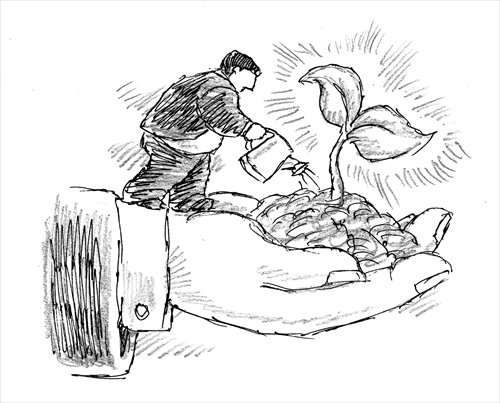HOME >> BUSINESS
China seeks synergies in investment in Russia
By Zhao Minghao Source:Global Times Published: 2015-9-14 23:33:01
Two nations resolving sensitive bilateral issues

Illustration: Peter C. Espina/GT
Recently, the first East Economic Forum kicked off in Russia's Far East hub of Vladivostok, showing that Russia is striving to inject fresh momentum into its economic development, against the background of Western sanctions.
About 80 investment contracts with a total value of 1.3 trillion rubles ($19 billion) were signed at the forum. Chinese Vice Premier Wang Yang, as well as 10 Chinese ministers and the governors of four Chinese provinces, attended the forum.
Also, 75 of China's largest companies took part in the event. Those companies' total turnover in 2014 was $1.7 trillion, equivalent to one-sixth of China's GDP. Chinese entrepreneurs have shown strong interest in investing in Russia's Far East.
Positive changes in bilateral economic and trade cooperation have also taken place.
First, under pressure from Western sanctions and decreasing global oil prices, the government of President Vladimir Putin is vigorously pursuing other measures to stimulate the nation's economy, especially in bringing its Far East development from idea to reality. Russia has enacted special federal laws to attract overseas investment with tax incentives.
In the past, Chinese investors were worried that Russia's development of its Far East region was half-hearted, but now they tend to think otherwise. At present, the annual economic growth in the Far East region has reached 5 percent, much higher than other regions of Russia.
China and Russia are holding negotiations for a joint development plan for Heixiazi Island (Bolshoi Ussuriysky Island) that aims to explore cooperation for cross-border transportation and tourism and bring new economic momentum to Russia's Far East. This will in turn boost the economic development of Northeast China.
Second, some sensitive bilateral issues are being resolved. Many Russian people have concerns that China's investment in Russia's Far East, especially in Russia's agricultural sector, poses a threat to national security. During the Shanghai Cooperation Organization summit in Ufa this July, Putin repeatedly stressed that China's contribution to the Far East region will be positive.
Both sides have discussed specific rules to avoid friction over land leases. In June, Zabaykalsky Krai, one of Russia's poorest areas, leased more than 1,000 square kilometers of land to a private Chinese enterprise. The enterprise will employ a large number of local people to develop the grain and food-processing industries. This could be a huge market opportunity for Russia since China has already become the world's largest food importer.
Third, China and Russia are promoting synergy between Russia's "Eurasian Economic Union" and China's "Silk Road Economic Belt." Russia's Primorsky Krai region is constructing a transport corridor with China's Heilongjiang Province and Jilin Province, which could cut shipping costs and time and expand bilateral trade.
In addition, the two nations are in talks concerning shipments of 30 billion cubic meters of gas from Russia's western gas pipeline to be delivered annually to China.
It's estimated that a deal could be concluded within this year. Russian media outlets have also reported that the giant deal is highly likely to be settled in yuan, as doing so will give Russia some risk protection against the financial settlement system prevailing in Europe and the US, especially given the tough Western sanctions against Russia.
Given its declining "demographic dividend" and decreasing returns on capital, the Chinese economy is undergoing a painful transition.
But it is a necessary process for China to update its export-oriented economic growth model. There are many reasons to remain optimistic about China's economic prospects, especially when plenty of Chinese enterprises aim to invest more abroad. And at the moment, more and more Chinese entrepreneurs have their sights set on Russia.
The author is a research fellow at the Charhar Institute in Beijing and an adjunct fellow at the Chongyang Institute for Financial Studies at Renmin University of China. bizopinion@globaltimes.com.cn
Posted in: Expert assessment